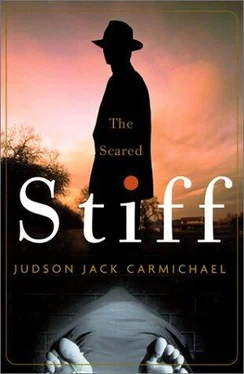“You aren’t worried about what will happen to you?”
“What have I done?” I asked him. “What crimes have I committed in Guerrera?”
“You faked your death,” he said, surprised by my question.
“What law did that break?” I asked him. “I made no effort to profit from that little prank, I—”
“Prank?”
“What else is it? If I were to dye my hair blond, I’d be faking something. Is that a crime? If I then tried to collect an inheritance that belonged to somebody who was blond, that’s a crime.”
He didn’t like this. He didn’t like the idea that I’d been doing all this scamming and scheming without breaking a whole bunch of laws. “What about the funeral?” he demanded. “You buried someone.”
“An indigent,” I told him, quashing my own doubts on that score. “An unknown person provided by Señor Ortiz.”
Scornfully, he said, “Impossible. It isn’t that easy to—” And then he stopped, and blinked, and immediately became tough again. “Very unlikely. We’ll check into it.”
Ah. I can be quick too. We will not check into it. The body Señor Ortiz provided — and the name Ortiz had struck Rafez between the eyes, I’d noticed — was actually something to do with Rafez himself, and now he knows it. He will not want that grave opened, though it would probably not be a good idea to force his hand by letting him know I know it. People who traffic in mysteriously dead bodies should not be toyed with.
So I merely said, “It was a funeral, that’s all. Señor Ortiz provided the body, he was paid, and he hasn’t complained.”
He cast around for something else, something to distract me from the body in my grave. “You destroyed an automobile.”
“A terrible accident, declared so by yourself, I believe, plus all those witnesses. The car rental people are insured, and they haven’t complained.”
“These forged documents,” he said, gesturing at my ID on his desk.
“Not forged at all,” I told him. “Legitimate documents issued by your government. I have not used one of them in the commission of any crime.”
He sat back to think about me. “So,” he said, “as far as you’re concerned, you have done nothing criminal, and there’s no reason to arrest you.”
“Not in this country,” I said. “Not unless you decide you’re angry with me and rig something up. If Leon Kaplan finds out I’m alive, and if then I went back to the States, he might want to press charges against me as an accessory to Lola’s crime. But he’d never be able to extradite me from here on a charge like that; everybody’s got more important things to do.”
“So you could stay here and be safe, you believe.”
“Safe from Leon Kaplan,” I said. “I don’t know about being safe from you, or the cousins in Tapitepe, or all the curious people around who might figure out there’s something wrong with me.”
“Yes, of course,” he said. “You’re right to worry about being safe from me, because now I know the one thing you don’t want generally known.”
“That’s right.”
“And you’re wondering what I’m going to do about it,” he said.
“I’m thinking of nothing else,” I assured him.
“I’m wondering that same thing myself,” he admitted. “On the one hand, it would be satisfying and a very good mark on my record if I were to uncover this... what is the word? Old-fashioned English word.”
“Dastardly,” I suggested.
“Yes, exactly! I knew you’d know it. Thank you.”
“De nada.”
“Were I to uncover this dastardly plot,” he said, and beamed at the sound of that, “it would be a great good mark for me, which by the way I could use. It might mean a reward for me from the insurance company.”
“Or not. I think they’re pretty miserly.”
“Possibly,” he said. “But the sad thing, of course, would be that, even if I couldn’t find a Guerreran crime to attach to you, and possibly I could, but even if I couldn’t, your lovely wife Lola would still go to jail.”
“I’d hate that,” I said.
“I’m sure she would too.”
“Absolutely.”
“Now,” he said. “What if I took a different course? What if I went along with this rather Jesuitical idea of yours that none of your sub-rosa activities have been actual crimes in terms of Guerreran law? What if I decided that it wasn’t up to me to discover an American criminal residing in America?”
“Lola, you mean.”
“Yes, exactly so. What if, further, I thought it would be of aid to the public peace and tranquillity if I were to take you under my wing until it is time for you — or Felicio Tobón, I mean, of course — to fly off to America? How long do you suppose that will be?”
“Lola should get the check by the middle of the week,” I told him, “this coming week. Then she’ll fly down, I’ll get my visa, and we’re out of here.”
“A week, then,” he said. “You would be under my protection for a week. Those oafs in Tapitepe would not bother you. No one in Guerrera would question you.”
“Would I go back to Casa Montana Mojoca?”
“No, no,” he said. “That’s not the best, not after you disappeared.”
“Too bad,” I said.
“You would stay with your in-laws in Sabanon,” he decided. “No one would wonder a thing, not if I decide to protect you.”
We looked at one another. He smiled slightly. He waited for me.
I said, “The check Lola is to get is supposed to be six hundred thousand dollars.”
“A fine amount of money,” he said. “And which I know to be the truth, because our friend Kaplan told me the same figure. How wise it is of you to be truthful with me.”
“I can see that,” I said. “Tell me, do you have any thoughts? Anything that might help you decide?”
“The term that floats in my mind,” he said, “is ten percent.”
Sixty thousand dollars. It could have been a lot worse. “That seems very decent,” I told him.
“Thank you.”
“I’ll tell Lola to bring it with her,” I offered.
“That would be best,” he agreed. “You understand, between us, it could not be a check. It would have to be cash.”
“Yes, of course.”
“Not siapas ,” he said.
I couldn’t help laughing. “I’d love to see that much money in siapas, ” I said.
“I’d like to see it in dollars,” he said.
We did not shake hands. It wasn’t that kind of deal. We simply smiled at one another, and stood, and the driver stood, and we went back down to the car.
I would now be under the protection of Rafael Rafez, which meant, of course, I would now be under the eye of Rafael Rafez, but that was all right. We were now useful to each other, so we were on an equal footing. It is true he was shaking me down, but not very badly, and in fact I would be getting something of value for my sixty thousand dollars. After three weeks of constant bobbing and weaving, constant trouble, constant worry, my final week in Guerrera would be calm and serene. I would be back in our bed in our room in Mamá and Papá’s house, waiting for Lola to join me. I could relax now, and so could Rafez, because he knew he would get his sixty thousand dollars. If he didn’t, he could easily block my departure from the country. And he could do it without having to open any ambiguous graves.
Once again, in the car, I sat next to the driver, with Rafez enjoying the expansive solitude of the backseat. Mostly, between Marona and San Cristobal, we talked about Casa Montana Mojoca, a place he knew only from brief daytime visits on duty and about which he was naturally curious. I answered his questions and tried to give him a sense of the place, but I’m not sure I succeeded. The American lifestyle can be observed more readily than it can be described.
Читать дальше












